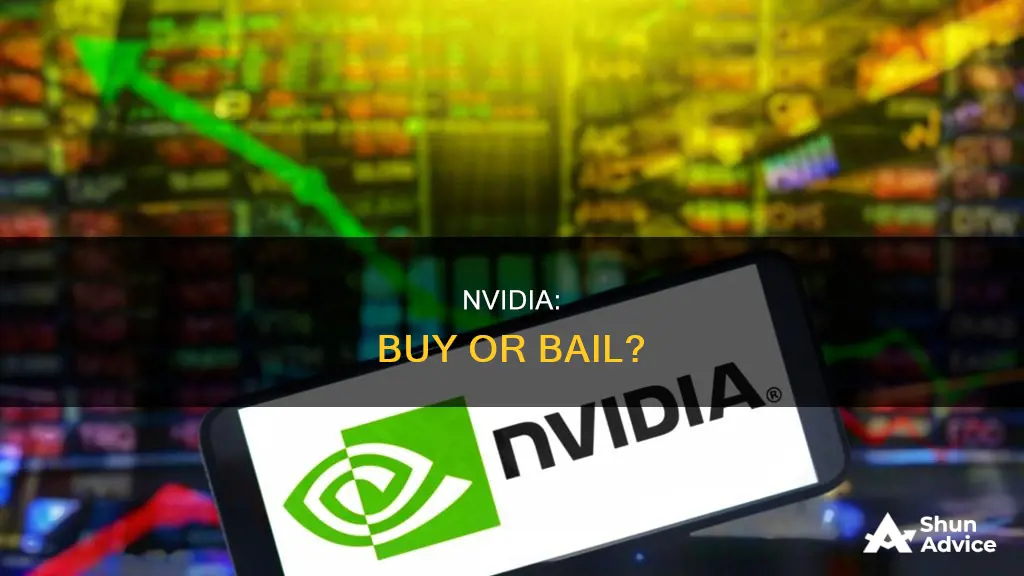
Nvidia is a leader in the design of graphic processing units (GPUs) and has had a long history of innovation since developing the GPU. The company's latest innovation is accelerated computing, which uses specialised hardware to significantly speed up work. Nvidia's GPUs are extremely valuable as artificial intelligence places huge computing demands on data centres.
Nvidia's stock price has been on a rollercoaster ride recently. The stock price fell by -1.91% on 5 July 2024, and the price has fallen in 6 of the last 10 days. However, the stock is expected to rise 63.57% during the next 3 months.
Nvidia's financial health is strong, with a very good 4 out of 5 rating according to InvestingPro's financial health analysis. The company's revenue increased by an eye-popping 262% year over year and 18% from the prior quarter. Nvidia also generates a lot of cash, with $15.3 billion of cash from operations and $14.9 billion in free cash flow in its 2025 fiscal first quarter.
Nvidia's dividend yield is very low at 0.03% as of mid-2024, but the company returns significant cash to investors through share repurchases. In 2024, the company authorised a massive $25 billion increase to its share repurchase program.
Nvidia has been an outstanding investment over the years, delivering a more than 74% average annual return to its investors over the last 10 years, significantly outperforming the S&P 500.
So, should you invest in Nvidia right now? Well, that depends on your investment goals and risk tolerance. Nvidia is a profitable and financially strong company with a history of innovation, and its stock has been a great investment in the past. However, the stock can be volatile, and there are some concerns about a potential slowdown in tech-related spending and Nvidia's high valuation. Ultimately, the decision to invest in Nvidia stock is up to you and your individual circumstances.
What You'll Learn

Nvidia's AI potential
Nvidia's AI inference platform, Triton, enables data scientists, application developers, and software infrastructure engineers to develop computer vision, speech, natural language processing, generative AI, recommender systems, and more. The company's AI platform also includes Morpheus for cybersecurity, RAPIDS for data analytics, NeMo for large language models, cuOpt for logistics and route optimization, and Merlin for recommender systems. Nvidia's AI capabilities are also being applied in the automotive industry, with the development of the DriveWorks SDK for self-driving vehicles.
In addition to its AI platform and specific AI products, Nvidia also offers the NVIDIA AI Enterprise software, which powers the end-to-end AI workflow. This software accelerates the data science pipeline and streamlines the development and deployment of production AI. With Nvidia AI, enterprises can transform any project into an AI project, with higher accuracy, efficiency, and infrastructure performance at a lower overall cost.
Nvidia's AI capabilities are further enhanced by its hardware offerings, such as the NVIDIA DGX systems, which are purpose-built AI supercomputers designed to give data scientists powerful tools for AI exploration. The company's GPU acceleration technology is available in data centers, desktops, laptops, and supercomputers, providing the necessary computational power for AI training and inference.
Overall, Nvidia's AI potential is vast, with a comprehensive range of products and services that cater to various industries. The company's AI capabilities are backed by its advanced hardware and software offerings, positioning it as a leader in the AI space.
Wellness Warriors: Who Invests in Health?
You may want to see also

Nvidia's stock price history
On April 19, 2024, Nvidia stock sank, exposing eight "secrets" for when to sell stocks. This was triggered by the tech-heavy Nasdaq's slide below key moving averages, which led to a decline in Nvidia's stock price.
However, as of July 5, 2024, Nvidia's stock price stood at $125.83, reflecting a decrease of 1.91% from the previous day's close of $128.28. Despite this recent drop, the stock has demonstrated an impressive performance over the past year, with a 12-month increase of 198.86% as of July 5, 2024.
Looking back further, Nvidia's stock price history shows a strong upward trend. For instance, on April 20, 2023, the closing price was adjusted to $39.23, compared to the 52-week high of $140.76 as of July 5, 2024. This indicates a significant increase in the stock price over this period.
Analysts' predictions and recommendations regarding Nvidia's stock vary. Some suggest that the stock is a buy, citing positive short-term signals and a general good trend. Others recommend profit-taking, especially for investors with a low risk-tolerance, due to the recent shift in market tone and Nvidia's sharp break below its 50-day line.
Scams: Why People Fall for Investment Schemes
You may want to see also

Nvidia's market competitors
When considering whether to invest in Nvidia, it is important to look at the company's market competitors. Nvidia's top competitors include Tier IV, Recogni, and Juniper Networks. Tier IV is a deep-tech company that develops technology for autonomous vehicles. Recogni focuses on AI and vision-oriented inference systems for the automobile industry, while Juniper Networks provides network solutions that enhance security and leverage artificial intelligence.
Other Nvidia competitors include Corerain Technologies, which operates in the field of AI and video analysis, and Rain Neuromorphics, which develops brain-inspired hardware for the AI sector. Ghost Autonomy is another competitor that develops autonomous driving software, and iSIZE, which offers deep learning solutions for video delivery.
In addition to these companies, Nvidia also faces competition from MangoBoost, which enhances data centre performance and efficiency, and GrAI Matter Labs, which develops programmable neuromorphic computing chips for machine learning and sensor analytics. Tenstorrent is another competitor that offers hardware and software products for deep learning within AI and machine learning.
With such a wide range of competitors in the market, it is important to carefully consider Nvidia's position and future prospects before making any investment decisions.
Fitness Investment: What's the Priority?
You may want to see also

Nvidia's stock price predictions
Rising Predictions
- A strong buying opportunity is predicted by one source, which expects the stock to rise by 63.57% in the next 3 months, reaching a price range of $199.37 to $238.48.
- Nvidia's investments in accelerated computing and AI are expected to drive profit growth, making it a potentially excellent long-term investment.
- Nvidia's stock has delivered a more than 74% average annual return over the last 10 years, significantly outperforming the S&P 500. This strong track record suggests that Nvidia could be a good investment for the long term.
Falling Predictions
- Nvidia stock has experienced a sharp decline recently, losing its position as the most valuable company in the world. This has sparked concerns about a deeper correction and the possibility of a broader market correction.
- High valuation ratios relative to the rising share price and average debt levels are financial warning signs, especially in the current environment of high-interest rates.
- Extreme volatility in Nvidia's stock is also a risk factor for short-term investors.
- One analyst predicts that for Nvidia to justify its mid-2024 market value, it would need to grow its earnings at a 70% annual rate over the next five years, more than double the expected rate.
Neutral Predictions
- Nvidia's stock is expected to fluctuate between support and resistance levels. If the current downward momentum persists, the price may retreat to $100. On the other hand, if investors perceive the movement as a correction and shift to buying, the stock could target a new peak around $150.
- Nvidia's financial health score is rated as "very good," and the company has strong financials, with analysts expecting sales growth and sufficient cash flow to cover interest expenses.
- Nvidia's dividend yield is very low at 0.03% compared to 1.3% for the S&P 500, but the company returns significant cash to investors through share repurchases.
Dubai's Investment Trends
You may want to see also

Nvidia's dividend payments
Nvidia typically pays dividends four times a year, and the next dividend is expected to be paid in three months. The dividend yield, calculated by dividing the annual dividend payment by the share price, is currently low at 0.1% as of August 13, 2023. However, it's important to note that the dividend yield may fluctuate as it is influenced by the share price.
Nvidia's dividend payout ratio, which compares earnings per share to the dividend per share, is 1.00% ($0.13/$1.71). This indicates that the company's dividend payments are sustainable relative to its earnings.
People Prefer Spending Over Saving and Investing
You may want to see also
Frequently asked questions
Nvidia is a leader in the design of graphic processing units. It has had a long history of innovation since developing the GPU. Nvidia's GPUs are extremely valuable as artificial intelligence places huge computing demands on data centers. The company's latest innovation is accelerated computing, which uses specialized hardware to significantly speed up work. It is also involved in the gaming, professional visualization, and automotive markets. Nvidia is a good investment option for those who want to invest in a company capitalizing on the long-term demand growth for computing power. However, investors need to be wary of the potential slowdown in tech-related spending and its effect on Nvidia's data center products.
Nvidia's stock has soared in popularity as a way to gain artificial intelligence (AI) exposure. The company's investments in accelerated computing position it to capitalize on the explosive growth in AI, igniting its earnings and stock price. Nvidia believes it's still in the early innings of the AI boom, which could make it a great long-term investment.
Nvidia stock could be volatile and might lose value. The company's high valuation following its AI-driven rally and the potential slowdown in tech-related spending are risks to consider before investing in Nvidia.







